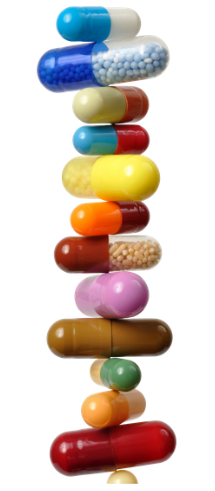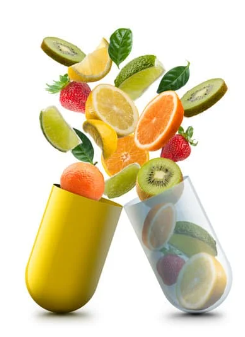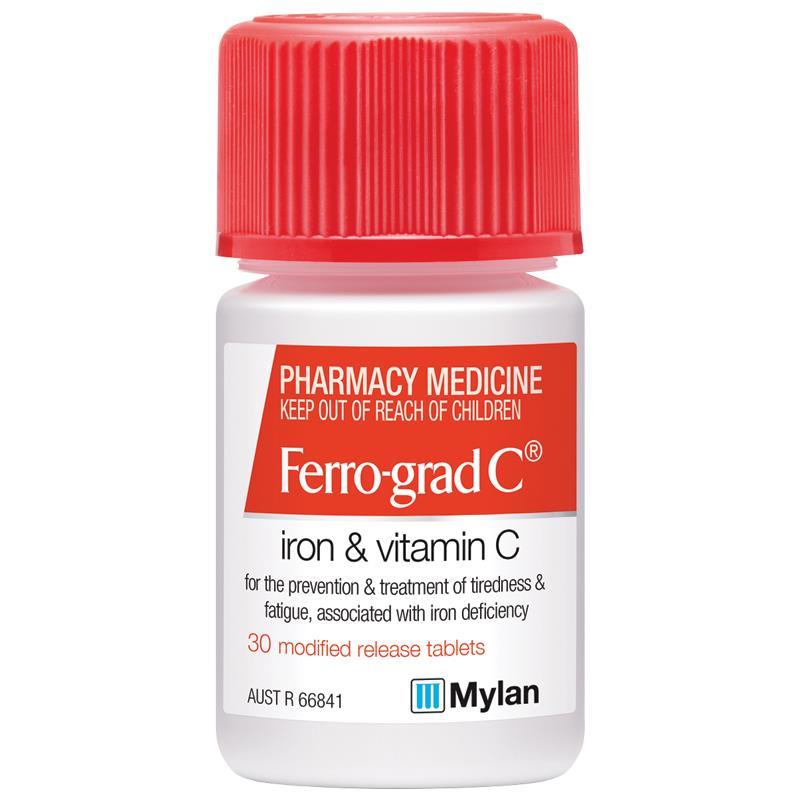Do You Need to Take a Multivitamin?

Vitamins play many important roles in the body.
There are 13 essential vitamins our body needs for normal, healthy functioning.
Our body cannot make these itself (or cannot make enough of them) so, for the most part, we need to get them through our diet.
When vitamins are missing from the diet, poor health and illness can occur.
Vitamin C deficiency = Scurvy
Vitamin D deficiency = rickets
Calcium deficiency = porous, weak bones & teeth
You may be surprised to know vitamins are usually only needed in small amounts. Too much of some can cause symptoms or toxicity.

The 13 vitamins are:
- A
- B1
- B2
- B3
- B5
- B6
- B7
- B9
- B12
- C
- D
- E
- K.
Wondering what happened to the missing letters? They were named in order, but later discovered that some weren’t vitamins, others were related to the B complex of vitamins so they got renamed.
Water Soluble Vitamins
There are 9 water soluble vitamins - the eight B-vitamins and vitamin C.
Water-soluble vitamins dissolve in water and are easily excreted from the body. So, a steady intake—ideally from a healthy diet—is important.
Fat Soluble Vitamins
The remaining 4 vitamins are classified as fat-soluble (vitamins A, D, E, and K). Consume with some healthy fats – olive oil on veggies or in salad dressings, avocado.
Fat-soluble vitamins A and D dissolve in fat. They can be stored in fatty tissues and the liver and accumulate in the body. If levels become too high, they can cause symptoms, and even become toxic.
Vitamins and minerals that can be harmful in excess include:
- A (retinol) -
- B3 (niacin/nicotinic acid)
- B6 (pyridoxine)
- C (ascorbic acid)
- D (colecalciferol)
- E (alpha-tocopherol)
- calcium
- magnesium
- zinc
- Selenium.

Do you need to take a multivitamin supplement?
The short answer – Not unless you’re deficient. For many reasons…
- Vitamins from food work better
- Even when the manufactured vitamin is the exact same structure as the naturally occurring vitamin.
- Folate is the only exception—the manufactured form is absorbed by your body better than folate from food.
2. Food provides lots of other chemicals and components that are great for our health
- There are other chemicals in food, such as enzymes, minerals and phytochemicals (plant chemicals) that work together with vitamins in complex ways in the body. Plus getting your vitamins from real food gives you the added benefit of fibre which is great for the gut in many ways.
- Phytochemicals are an important part of a healthy diet and may reduce some diseases such as cancer and heart disease. Vitamin supplements generally do not provide them.
3. Multivitamins don’t contain doses sufficient to correct a deficiency
- Multivitamins are like a General Practitioner – they know a little bit about everything, but are not a specialist in one thing!
- Multivitamins contain a little bit of everything, but don’t have a high enough dose to necessarily fix a deficiency if there’s a problem.
- Take Centrum for example, a common multivitamin for adults here in Australia. It contains 5mg or Iron and 90mg of Vitamin C.
- You would struggle to correct iron deficiency with such a small dose!
- I would typically use something like FerroGrad C to correct iron deficiency as it contains 105mg elemental iron + 500mg Vit C


Lots of athletes take a multivitamin because it makes them feel healthy. In fact, a large US study1 examined self-reported health of vitamin users vs non-vitamin users. (n=21,603 Americans in the 2012 National Health Interview Survey).
Vitamin users self-reported 30% better overall health compared to non-vitamin users, despite no clinical difference in measurable health outcomes. This is a great example of the PLACEBO EFFECT!
When would vitamin supplementation be useful?*
- When you’re deficient – Iron, Vitamin D. But you need to take a specific supplement with the right dosage to correct the deficiency
- Pre-Conception and early pregnancy – Folic acid – reduces the risk of neural tube defects. Iodine – seems to be lacking in diet. Iron – if low as requirements for iron increase with pregnancy and breastfeeding
- Vegetarian/Vegans – B12, Iron – rich sources come from animal products in the diet and may need to be supplemented
- Older adults – calcium and vitamin D to maintain bone health if unable to meet needs from diet
- Incredibly fussy kids – medical professional may recommend
*This is not specific medical advice. Please see your doctor if you’re unsure
Summary
You don’t need to take a multivitamin, unless you’re deficient. And then – you should only be taking the thing you’re deficient in, not a multi.
If you think it’s a good safety blanket – remember vitamins from food are better than manufactured ones.
Consult your GP if you are unsure – and get a blood test before buying supplements
Save your money, put it in a separate bank account called TNA and put it towards your education next time we open doors to the Academy!! ;)
In the meantime, check out my new TRIATHLON NUTRITION KICKSTART course at triathlonnutritionkickstarter.com
 References
References
Paranjpe et al. 2020. Self-reported health without clinically measurable benefits among adult users of multivitamin and multimineral supplements: a cross-sectional study. BMJ Open. Available from: https://bmjopen.bmj.com/content/10/11/e039119
To dive deeper, listen to the Triathlon Nutrition Academy Podcast, EP 83 - Do You Need to Take a Multivitamin?
If you are interested in learning more about the Triathlon Nutrition Academy Program and what it can do for you, head HERE to join the waitlist for our next opening.




